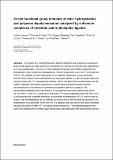On the functional group tolerance of ester hydrogenation and polyester depolymerisation catalysed by ruthenium complexes of tridentate aminophosphine ligands
Abstract
The synthesis of a range of phosphine-diamine, phosphine-amino-alcohol, and phosphine-amino-amide ligands and their ruthenium(II) complexes are reported. Five of these were characterised by X-ray crystallography. The activity of this collection of catalysts was initially compared for the hydrogenation of two model ester hydrogenations. Turnover frequencies up to 2400 h-1 were observed at 85 oC. The catalysts turnover, albeit slowly at near ambient temperatures. Using a phosphine diamine RuII complex that was identified as the most active catalyst, a range of aromatic esters were reduced in high yield. The hydrogenation of alkene-, diene-, and alkyne functionalised esters was also studied. Substrates with a remote, but reactive terminal alkene substitutent could be reduced chemoselectively in the presence of 4-dimethylaminopyridine (DMAP) co-catalyst. The chemoselective reduction of the ester function in conjugated dienoate ethyl sorbate could deliver (2E,4E)-hexa-2,4-dien-1-ol, a precursor to leaf alcohol. The mono-unsaturated alcohol (E)-hex-4-en-1-ol was produced with reasonable selectivity, but complete chemoselectivity of C=O over the diene is elusive. High chemoselectivity for the reduction of an ester over an alkyne group was observed in the hydrogenation of an alkynoate for the first time. The catalysts were also active in the depolymerisation reduction of samples of waste PET to produce benzene dimethanol. These depolymerisations were found to be poisoned by the ethylene glycol side product, although good yields could still be achieved.
Citation
Fuentes García , J A , Smith , S , Scharbert , M T , Carpenter , I , Cordes , D B , Slawin , A M Z & Clarke , M 2015 , ' On the functional group tolerance of ester hydrogenation and polyester depolymerisation catalysed by ruthenium complexes of tridentate aminophosphine ligands ' , Chemistry - A European Journal , vol. 21 , no. 30 , pp. 10851–10860 . https://doi.org/10.1002/chem.201500907
Publication
Chemistry - A European Journal
Status
Peer reviewed
ISSN
0947-6539Type
Journal article
Collections
Items in the St Andrews Research Repository are protected by copyright, with all rights reserved, unless otherwise indicated.

